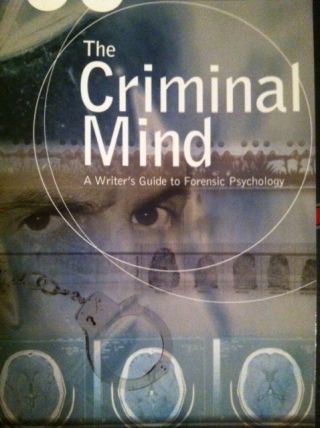Forensic Psychology
Forensic Psychology 101
For students and writers, I clarify this discipline’s basic aspects.
Posted August 31, 2014

Since I’m preparing for my fall courses, two of which are forensic psychology, it seems appropriate to post a blog about this intriguing discipline. I once wrote a book about it specifically for writers (The Criminal Mind), and I receive a lot of questions about what forensic psychology is. I can’t cover every area in a blog, but here are some basics:
Wherever the legal system and psychology intersect, you have forensic psychology. While most practitioners are clinicians with a specialization in forensic issues and assessment, this applied discipline involves a range of activities in several civil and criminal arenas.
These include consulting on criminal investigations, assessing threats of violence in schools or workplaces, determining someone’s fitness for guardianship, developing specialized knowledge of crimes and motives, evaluating the impact of sexual harassment, and conducting research on a subject that has forensic implications.
For the court, forensic psychologists might be hired (by the court or by an attorney) to evaluate a person’s present psychological state for competency to participate in some part of the legal process (waiving rights, standing trial, etc.). They might also evaluate a defendant’s mental state at the time he or she allegedly committed an offense (MSO). In addition, psychologists appraise behaviors such as malingering or confessions.
As consultants, psychologists might assist a forensic artist with a facial reconstruction or help a lawyer select jurors. They can defuse a potentially violent situation with negotiation or risk assessment, or assist death investigators clarify ambiguous death determinations. Some of these professionals work for police departments to screen for fitness for duty, teach stress management or determine the need for trauma counseling. Many practitioners work in prisons or forensic psychiatric institutions. They might even consult on prison design.
To be effective as experts in a courtroom, forensic psychologists must know the court’s expectations and functions. As witnesses who assist fact-finders to grasp sophisticated issues, they must be credible, competent, and prepared. They should also understand that the court prefers clear decisions, jargon-free assessments, and objective information that is relevant to the specific issues.
In addition, they must know about landmark cases in their field, as well as the state or federal requirements to be qualified as experts. They must be prepared to explain to a jury how they arrived at their findings. This can involve a firm grasp of psychological assessment instruments, the procedures for making a diagnosis, or methods of statistical analysis.
Ethical experts remain objective, speak only within the limits of their expertise, and refrain from changing their opinion to please an attorney.
Psychologists also participate in forensic work outside the courtroom, but a popular assumption that they track down serial killers derives from fiction, not real life. Although psychologists might interview serial killers as research or preparation for the court, they’re not detectives, and most are not behavioral profilers.
Nevertheless, the FBI’s Behavioral Analysis Unit does provide training in criminal psychology to agents who will act as consultants. They have also employed psychologists as consultants and as researchers.
Among the research areas that tend to regularly overlap with forensic issues are psychological syndromes, cognition and perception (especially memory), eyewitness accuracy, the detection of deception, and false confessions. Experts in any area might become expert witnesses in a legal case or might assist with consulting in some other area. They might also offer an educational platform for attorneys, police officers, corrections personnel, or judges.
Psychologists can be present in emergency service fields. They might consult on hostage negotiations and special unit (SWAT, Tactical Response Team) evaluations. They can also assist in mass disaster training and counseling, or offer assistance in several different ways with cold cases or innocence projects.
It’s often the case that forensic psychology is entrepreneurial. Interested students will need an education in clinical and abnormal psychology, as well as in criminal justice. They will also need to develop a business model for themselves and learn to network in the right places.
The description above is not exhaustive, but these are the areas I describe in a basic course. From death investigations to clinical assessment to the make-up of a jury, professionals with focused psychological expertise can offer valuable expert assistance to law enforcement and the courts. The more credentialed they are in a specific skill or area, the more opportunity there is for creating a niche.




